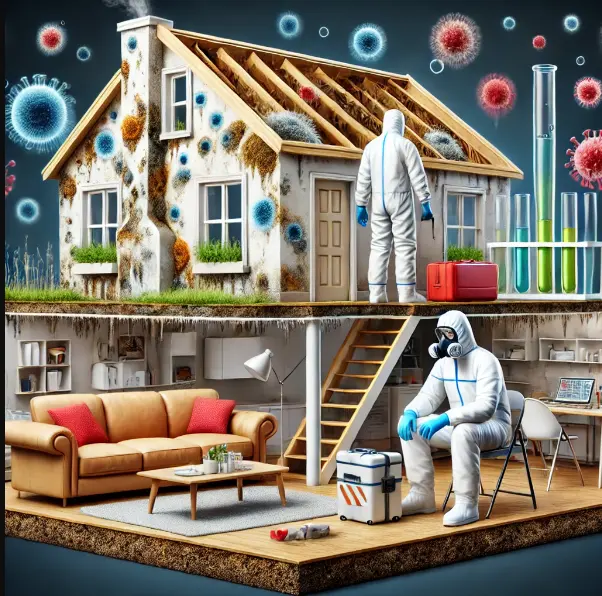Understanding How Mycotoxins Impact Health - The Mould Group

Understanding How Mycotoxins Impact Health andThe Hidden Risks
What Are Mycotoxins?
Mycotoxins are toxic compounds produced by certain types of mould. These harmful substances can contaminate residential and business properties, particularly where moisture and mould growth are present. In Australia, awareness of the dangers associated with mycotoxins is limited, posing significant health risks to people living or working in affected environments.
The Invisible Threat
Many people are familiar with the unpleasant sight and smell of mould, but fewer understand the invisible dangers that lurk in the form of mycotoxins. According to a report from the World Health Organization (WHO), over 25% of the world’s food crops are contaminated with mycotoxins annually. While this statistic relates to food, it highlights the widespread presence of these toxins. In indoor environments, mycotoxins can become airborne, making them easy to inhale.
How Mycotoxins Enter the Body
Mycotoxins can enter the body through inhalation, ingestion, or skin contact. When mould releases spores, these spores may carry toxic compounds. People in contaminated environments unknowingly breathe in or come into contact with these spores, leading to potential health complications.
Health Effects of Mycotoxin Exposure
Exposure to mycotoxins can lead to a range of health issues, depending on the level of exposure and an individual’s sensitivity. Here are some key health risks:
- Respiratory Problems: The National Institute for Occupational Safety and Health (NIOSH) notes that mycotoxins can trigger respiratory symptoms, such as chronic coughing, wheezing, and sinus infections. People with asthma or other pre-existing respiratory conditions are particularly vulnerable.
- Neurological Symptoms: Prolonged exposure to mycotoxins has been linked to neurological symptoms, including memory loss, difficulty concentrating, and headaches. Studies have shown that mycotoxins can cross the blood-brain barrier, affecting cognitive function.
- Immune System Suppression: Mycotoxins can weaken the immune system, making individuals more susceptible to infections. A compromised immune system can struggle to fight off common illnesses, leading to prolonged recovery periods.
- Skin Irritation: Direct contact with mycotoxins may cause skin rashes, itching, and irritation. Sensitive individuals may experience severe reactions, requiring medical attention.
The Importance of Mycotoxin Testing
Given the potential health hazards, mycotoxin testing is crucial for any property where mould is suspected. Many Australians are unaware of the dangers of mycotoxins, partly due to a lack of education on the subject. A recent survey revealed that only 15% of Australians understand the health risks associated with mould and mycotoxins.
Mycotoxin testing involves specialised equipment and laboratory analysis to detect the presence of these toxic compounds. At The Mould Group, our experts use advanced techniques to ensure comprehensive assessments of residential and commercial properties. Early detection can prevent serious health consequences and protect the wellbeing of occupants.
How Mycotoxins Impact Indoor Air Quality
Mycotoxins not only pose direct health risks but also compromise indoor air quality. Poor air quality is a significant concern, especially in workplaces and homes where people spend long periods. The Environmental Protection Authority (EPA) states that indoor air quality can be up to five times worse than outdoor air, with mycotoxins being one of the contributing factors.
In environments with compromised air quality, symptoms such as fatigue, dizziness, and allergic reactions can become more pronounced. Property owners should prioritise regular mould inspections and testing to ensure a safe living or working space.
Mycotoxins and Long-Term Health Risks
One of the most concerning aspects of mycotoxin exposure is its long-term impact. Health issues may not appear immediately, and symptoms can be subtle at first. Over time, chronic exposure can lead to severe conditions, such as liver damage, autoimmune disorders, and even cancer. The International Agency for Research on Cancer (IARC) has classified certain mycotoxins, like aflatoxin, as carcinogenic.
This highlights the need for proactive measures in mould and mycotoxin management. Prevention and early detection are key to minimising long-term health risks.
Preventative Measures to Reduce Mycotoxin Exposure
While professional mycotoxin testing and mould remediation are essential, there are also preventative steps you can take:
- Control Humidity Levels: Keeping indoor humidity below 60% can help prevent mould growth. Use dehumidifiers in damp areas, such as basements and bathrooms.
- Fix Leaks Promptly: Address any water leaks or damage immediately to stop mould from developing.
- Ventilation: Ensure proper ventilation in areas prone to moisture, like kitchens and bathrooms.
- Regular Inspections: Schedule routine inspections to identify any signs of mould growth early. Prevention is always better than remediation.
Why Choose The Mould Group for Mycotoxin Testing?
The Mould Group specialises in comprehensive mould and mycotoxin testing services. Our experienced team uses state-of-the-art equipment to detect and analyse toxins, providing you with clear and actionable results. We understand the unique challenges Australian property owners face and are committed to raising awareness about the dangers of mycotoxins.
Our goal is to create safer environments for residents and workers by addressing the root cause of mould problems. By choosing The Mould Group, you are taking a proactive step towards protecting your health and property.
Coming Up Next
Stay tuned for our next article, where we will dive deeper into how mould testing works and the steps involved in a comprehensive inspection. Understanding this process is essential for effective mould and mycotoxin management.

